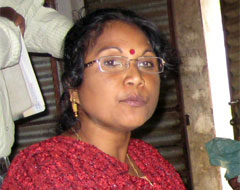Where We Work
See our interactive map


Jharna Tigga
Jharna Tigga works with the Indian government’s Integrated Child Development Services program supervising about 40 Anganwadi centers. She has been doing this work for the past two decades, visiting four centers a day when public transportation is available. When it’s not, she visits as many centers as she can on foot, often walking as much as ten kilometers a day. The centers are spread around Jharkhand’s Khunti District, a district with a population of over half a million.
The Anganwadi centers provide women and children with immunizations, nutritious food, clean water, bathroom facilities, and a learning environment for young children. The centers are government-sponsored and cater to pregnant and lactating women and children six years old or younger. Throughout the country, there are an estimated one million of these centers, which employ some 1.8 million workers, most of whom are women, to prevent or treat malnourishment and other childhood illnesses.
These centers rely on women like Jharna to counsel young mothers on healthy dietary practices and family planning. Jharna is a mother herself with two teenage boys—17 and 19 years old. She encourages her sons as well as the girls she counsels to make informed choices about marriage and education rather than blindly follow societal norms. Jharna also talks to adolescent girls about the dangers of anemia and how to prevent it, about reproductive health, and about the risks of early marriage. As a supervisor, Jharna also trains community health workers to counsel women about a nutritious diet for them and their children, how to recognize symptoms of malnutrition, and to refer severe cases to a malnutrition treatment center—a critical step in preventing children’s deaths.
One of India’s main vehicles for reaching communities is through Village Health and Nutrition Days held once a month at the Anganwadi centers. The entire surrounding community is invited to these outreach events, and local health workers offer a number of services such as antenatal care and vaccinations as well as information about family planning and reproductive health, among other things. The Vistaar Project assists officials from the Health Department and the Women and Child Development Department in orientating supervisors on how to organize and monitor the Village Health and Nutrition Days. In the districts in Jharkhand state where the Vistaar Project works, the percentage of these events which were rated as meeting quality standards rose from 15% to 40% over a one-year period. These events are rated on the participation of all three health workers*; the services made available to members of a disadvantaged community; and whether at least 7 out of 15 maternal and child health and nutrition services were offered.
Jharna has been counseling for years and has received additional training on how to counsel community members at these events. On the village gathering days and at the Anganwadi centers, she offers and supports other community health workers to register pregnant women, offer antenatal care services, provide immunization to women and to babies under one year of age, monitor children’s weight and growth, and give children and pregnant and lactating women supplementary nutrition. In particular at the Village Health and Nutrition Days, Jharna is able to meet and spend time with the community members one-on-one as well as more closely supervise and support health workers as they are providing services including nutrition; reproductive health care; adolescent health care; and information on sanitation, family planning, postnatal care, and newborn care.
*The three health workers are the auxiliary nurse midwife, the Anganwadi worker, and the Sahiyya.
The Vistaar Project is led by IntraHealth International and funded by the United States Agency for International Development.



